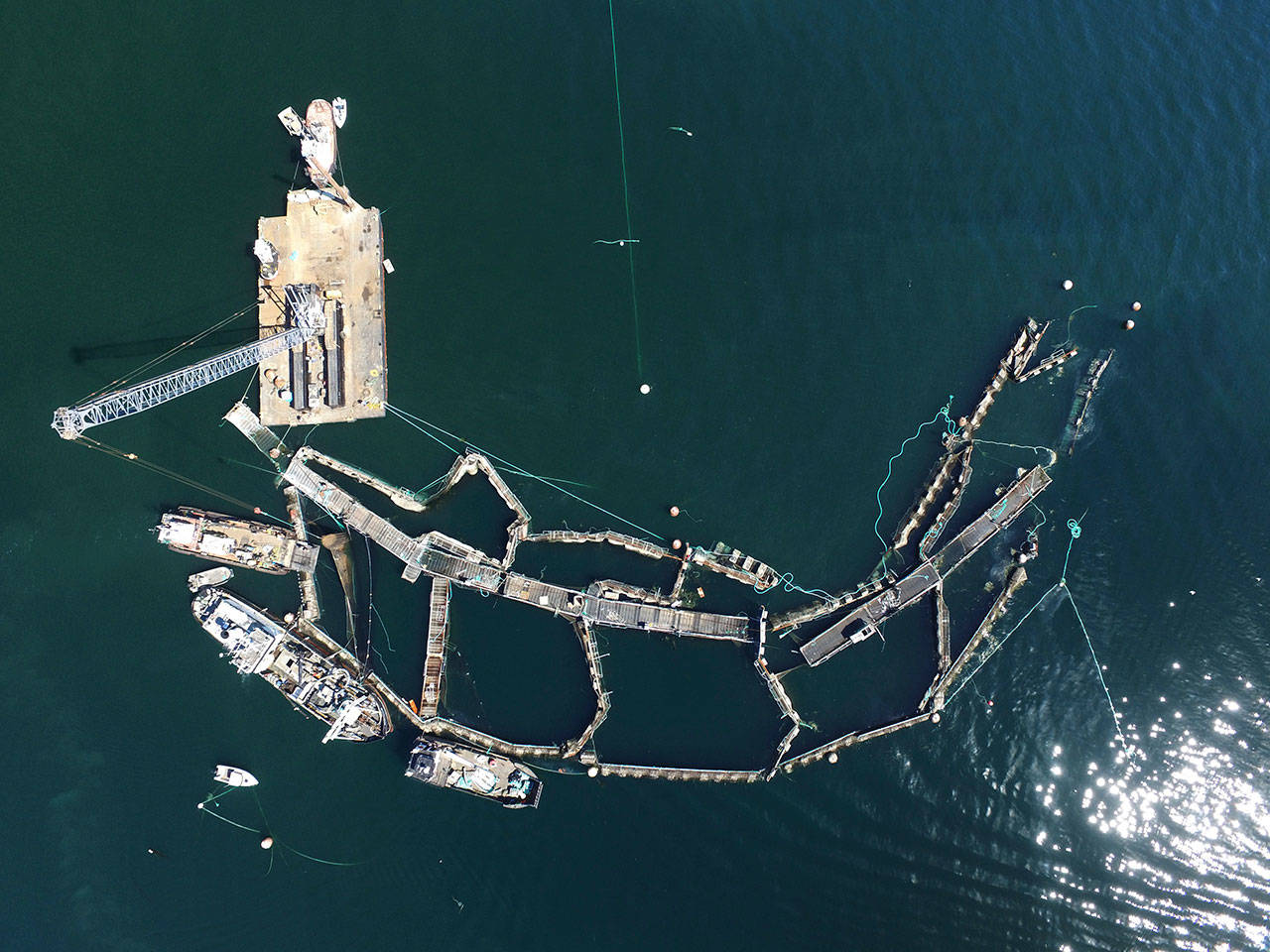By Phuong Le
The Associated Press
SEATTLE — Washington state will phase out marine farming of Atlantic salmon and other nonnative fish by 2022 under legislation signed Thursday by Gov. Jay Inslee.
Net pens growing Atlantic salmon in state waters have operated for several decades but the practice came under heavy criticism after tens of thousands of nonnative fish escaped into waterways last summer.
Inslee has said the risks are not acceptable given the high priority — and hundreds of millions of dollars spent — on bringing back declining populations of native Pacific salmon runs.
The legislation sponsored by Rep. Kristine Lytton, an Anacortes Democrat, would end state leases and permits for operations that grow nonnative finfish in state waters when current leases expire.
It targets Canada’s Cooke Aquaculture Pacific, the largest producer of farmed Atlantic salmon in the U.S., whose net pen off Cyprus Island in the San Juan Islands collapsed Aug. 19.
Cooke Vice President Joel Richardson did not immediately provide a comment Thursday.
State officials in January blamed Cooke’s negligence for failing to maintain its net pens. Top state officials said the escape of the salmon put the state’s ecosystem at risk and fined the company $332,000. Up to 263,000 invasive Atlantic salmon escaped into Puget Sound, raising fears about the impact to native Pacific salmon runs.
Cooke currently holds two leases with the state that both expire in 2022. The state canceled two other Cooke leases in recent months following inspections at those facilities. One was in Port Angeles Harbor. The company had filed a lawsuit saying that Commissioner of Public Lands Hilary Franz had no basis to terminate its 10-year lease in Port Angeles Harbor on Dec. 15.
The bill had been approved by the state Legislature earlier this month. After lengthy debate, the Senate passed the bill on a 31-16 vote March 2. The House earlier passed HB 2957 on 67-31 vote. District 24 legislator Mike Chapman, D-Port Angeles, was a sponsor of the bill.
Environmental groups and others cheered the signing of the legislation Thursday.
“This was a major step forward to restore the health of Puget sound and our wild salmon,” said Kurt Beardslee, who directs The Wild Fish Conservancy.
The Washington Fish Growers Association had urged the governor to veto the bill, calling it a drastic measure to ban an entire farming sector that would put hundreds of rural workers out of jobs.
Initiative activist Tim Eyman has filed two proposed referenda with the state that would put legislation phasing out nonnative finfish farming to the people for a vote.
Last month, Richardson told state lawmakers that Cooke would be able to seek damages under a provision of the North American Free Trade Agreement if the measure passed. He said the bill would strip the Canada-based company of its $76 million investment and that previous American companies experienced major fish escapes but weren’t punished in the same way.
At Thursday’s bill signing in Olympia, Inslee partially vetoed a section of the bill that said in part that the Legislature would further study marine finfish aquaculture. Inslee said the section wasn’t needed to implement the bill and he didn’t agree with all the assertions made in it.
Washington state now joins Alaska, which has banned commercial finfish aquaculture. Oregon and California do not have commercial salmon net pen operations.
Marine aquaculture is promoted by the federal government and others as a sustainable solution to feed a growing demand worldwide for seafood. The U.S. currently imports about 90 percent of its seafood and half of that is farmed, according to NOAA Fisheries.
John Volpe, associate professor of environment studies at the University of Victoria, said this month that there are too many issues.
“I’ve long argued that salmon farming in North America is in search of a problem. It comes with a boatload of issues. It’s not easy to justify,” he said.
Kenneth Warheit, who supervises the genetic and health laboratories for the state Department of Fish and Wildlife, said he thinks “that Atlantic salmon aquaculture in the state of Washington poses a low risk to our native salmon.”

